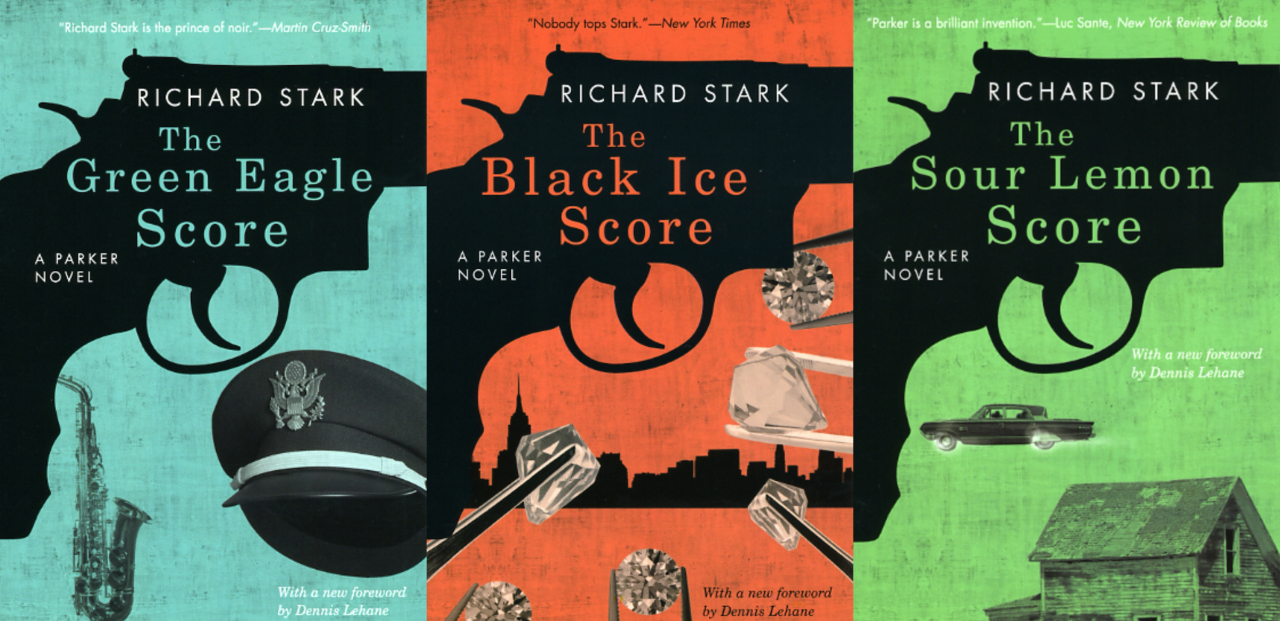tough business:
a parker site
“All about cold hard practicality” - An Exclusive Interview with Dennis Lehane


Some pretty prestigious writers, critics, and well-known figures in the world of crime fiction have been involved with the University of Chicago Press editions of Parker, and Tough Business has been lucky enough to interview a good number of them. It's our pleasure to announce that our next guest is Dennis Lehane, award-winning author of more than a dozen novels, including Mystic River and Shutter Island, which have been adapted to film by Clint Eastwood and Martin Scorsese respectively.
Dennis talked about Richard Stark's influence on his writing, his first time meeting Donald Westlake, and much more!
1) In your foreword for the University of Chicago Press editions of Parker, you mention reading all sixteen original books in the summer of '86. How did you first come across the novels?
Avon released the entire series around that time in mass market paperbacks with pulpy covers. It's possible it was earlier – summer of ‘85 – I just remember I was driving airport shuttle buses and had a lot of downtime between runs, so I read the whole series, mostly while parked outside a Dunkin' Donuts in Back Bay, Boston, in a single summer.
2) Speaking of, your foreword appears in the three 'Score' novels (The Green Eagle Score, The Black Ice Score, and The Sour Lemon Score) that probably best illustrate Parker at work. How were you first approached to write the foreword? Were you assigned specific books, or did you choose them?
I can't remember how I was approached. The books were assigned to me. If it had been up to me, I would have definitely wanted to write the intro to Butcher's Moon, which is my favorite.
3) We recently spoke to Charles Ardai, co-founder and editor of Hard Case Crime, and he talked about how Donald Westlake was exactly like he'd expected from his comedic caper novels – except for one occasion where "just a touch of Stark emerged." Did you notice anything like that when you met Mr. Westlake? What was your first impression of him?
Westlake was hanging with Evan Hunter at this weeklong writers conference we scored at a Club Med in the Caribbean; Harlan Coben had somehow managed to arrange this. Maybe so we'd all feel forever in his debt, which most of us do. That was one unforgettable week. Those NYC Old Timers (as we thought of them; Larry Block was part of that same group) were very cool dudes. They'd come up at a different time. If you think crime fiction was ghettoized in the 90s, that was a golden age compared to what they'd gone through. These were guys who'd been paid by the word and were almost never reviewed in respectable publications. They hadn't had the luxury to take on the literary airs and larger ambitions their successors could. So Westlake was very unfussy and had a workmanlike attitude toward his job. A definite Ass in the Chair guy, that's how you got it done. I talked to him a lot about his screenwriting, particularly his contribution to The Stepfather and his work on The Grifters. I think I went full fanboy on him only once, chatted him up a bit about the Stark books and told him what they'd meant to me, how much they'd taught me about writing clean and concrete prose and how to best do violence on the page. He acted the same way I do when I get compliments – uncomfortable – so I stopped pretty quickly.
4) You wrote extensively about Parker's characterization in your foreword, defining him as a "sociopath" and stating that he is "as bad as he seems." At the same time, you also acknowledge his reaction to Grofield's kidnapping in Butcher's Moon – in fact, Handy McKay points out that Parker wouldn't do this for anyone else in a pivotal scene in the novel. Do you suppose the latter stems from a sense of loyalty/friendship on Parker's part? How do you reconcile these two sides of him?
He's a sociopath but he has a code. He's not capable of feeling much for anyone but if he feels anything at all, it's for Grofield. And the code. It's similar to Sam Spade's code in The Maltese Falcon – it has nothing to do with feelings. It's all about cold hard practicality. Someone kills Archer, Spade will find out who did it or it will hurt his business. Someone messes with Parker's crew, he's going to make them regret it, or else everyone will think they can mess with his crew.
5) You describe Parker as the abolition of wish fulfillment, but he's not Richard Stark's only protagonist. Alan Grofield appeared in four Parker novels as well as starring in a spin-off series of his own, and in Butcher's Moon, he's treated as something of a deuteragonist. Would you ascribe any deeper meaning to Grofield's narrative function?
First, I had to look up "deuteragonist." And I took four years of Latin and have an MFA. Second, I don't ascribe much deeper meaning to any writer's work unless there are clear breadcrumbs pointing me in that direction. So much of what we do is subconscious. We're far less calculating than critics and theorists think. (Except when we're more so.) I suspect Westlake decided it would be cool to make Grofield a major part of the big finale of the Parker books (I don't count the second wave of Parker books. For me it all ended with Butcher's Moon.) I don't think much more went into it than that. That's just one man's opinion.
6) As an author whose work has been adapted to film on more than one occasion, which Parker adaptation do you think captures the novels best?
Brian Helgeland's director's cut of Payback. (Definitely not the studio cut.) I know it's heresy but I find Boorman's Point Blank too self-conscious and, well, fussy. It's like a crime movie made by a Parisian film school student. There's real greatness in it, but way too much gilding around the lily. Hegeland's Payback is lean, mean, funny as hell, and delightfully scuzzy, just like the books (well, except the humor; the books weren't really all that funny, which is weird because Westlake was the funniest crime fiction writer of his generation.)
7) Do you feel Westlake's work has influenced your own writing?
Not the rest of Westlake's work – which is great but didn't influence me at all. But the Stark books? Oh, without a doubt. I'd put him on my Rushmore of Influences, alongside Elmore Leonard, Raymond Carver, Richard Price, and Graham Greene. That impeccably lean style, the sheer precision of the prose? I don't think we'd see anything that would approach it until Lee Child came along. There's a real artistry to writing clean. When the prose is that chiseled, the brutality of the world he was writing about – the blood and guts of it – is all the more shocking because of the spotless cleanliness of the authorial voice.